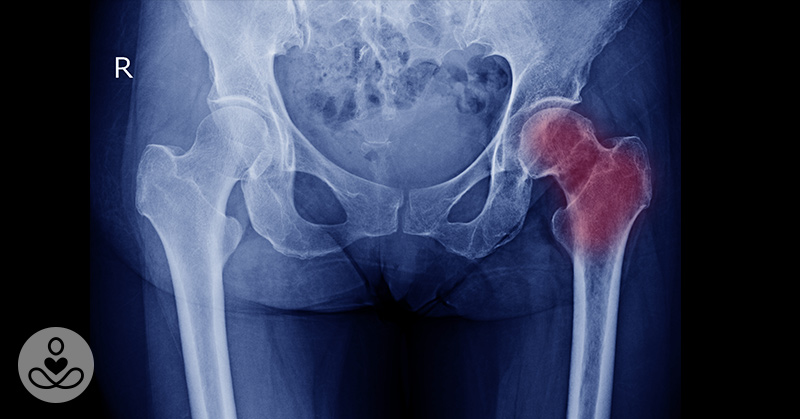A recent study in which researchers followed over 75,000 post-menopausal women for 21 years showed a correlation between high doses of B6 and B12 and hip fractures. [1] The objective of the study was to determine if higher than average intake of B6 and B12 from food and supplements were linked to an increased risk of hip fractures. The highest risk was found to be with a combination of B6 and B12, and less so on their own.
The participants completed a questionnaire that included lifestyle, medical history and disease risk factors. A biennial questionnaire was then followed up during the 21 year period. In addition, every 4 years dietary information was also completed.
While the findings indicate that there is a correlation, there were also some concerns with the study itself. So what are the pros and cons of the study? How does it apply to the vast majority of the population?
Pros of the study
Strength of the study includes a large number of participants and the biennial in-depth assessments of diet, supplement intake, and other possible cofactors.
Cons of the study
While the study showed a correlation between hip fractures and the vitamins, a direct link could not be established. This means the vitamins may not have caused the increased risk in hip fracture. It’s hard to know if the study participants began taking supplements because of ill health or if they caused it.
The testing population was also limited to post-menopausal registered nurses and as such cannot be applied to the entire population. The findings may be applicable, but we cannot know for certain.
Test subjects changed during the study. When the study began in 1976 it included 121,701 female registered nurses ages 30 to 55. Postmenopausal women were added to the study in 1984, this is also when vitamin B supplement use was first accessed.
The final study sample included 75,864 postmenopausal women for primary analysis. The women were followed up from June 1984 through May 2014.
One can only expect that in a study of over 75,000 there was great fluctuation in the overall health of the participants.
The list of supplements that were documented also changed in 1998, when additional supplement information was added.
Use of questionnaires, supplement and participant changes may have affected the quality of data obtained.
The Benefits of Vitamins B6 & 12
What is B6 for?
Vitamin B6 has many important roles in the body including healthy brain development, developing a strong immune system and healthy nervous system. B6 also helps to make hemoglobin which carries oxygen to red blood cells, as well as helping to make antibodies that fight illness. B6 helps to absorb and break down nutrients including carbohydrates and protein, which provides the body with energy and helps to stabilize blood sugar levels. B6 can also be helpful for morning sickness. [2]
B6 is found in a variety of foods, including meat, fish, chickpeas, beef liver, bananas, potatoes and other starchy vegetables. [2]
Signs of B6 deficiency include: skin rash, cracked and sore lips, sore shiny tongue, mood irregularities, weakened immune system, low energy, excessive tiredness, tingling and pain in your hands and feet and seizures. [2]
What is B12 for?
B12 is critical for health as it helps to make DNA (deoxyribonucleic acid) and RNA (ribonucleic acid). DNA provides the body with genetic information for cells to grow, while RNA is the messenger that carries the instructions for the DNA. B12 also helps the body make red blood cells and helps with healthy nerve and brain function. This vitamin is also helpful for those following a vegan or vegetarian diet, as well as individuals with anemia. [3]
B12 is naturally found in clams, fish, meat, eggs and dairy products. [3]
Signs of B12 deficiency include: weakness, excessive fatigue, pale or jaundiced skin color, pins and needles sensation on skin, changes in balance and coordination, inflamed tongue, dizziness, feeling breathless, vision changes, and mood changes. [3]
Talk to Your Doctor
It’s important to have your doctor check your vitamin levels if you are concerned you may be deficient. B6 deficiency is less common than B12.
It is especially important if you have any health conditions that interfere with your body’s ability to absorb and cycle vitamins and minerals.
In conclusion
Supplements are just that…to supplement your health. It is always best to get your nutrition from a clean healthy, whole, organic diet. Supplements are meant to fill in the nutritional gaps and aid the body with deficiencies that are caused by genetics, illness, etc.
There should be a reason for any supplement you are taking such as to help recover from illness, surgery, pregnancy, deficiency or general health.
As with any food or supplements, too much of anything can be harmful to your body. Talk with your practitioner about what supplements and dosages are right for you.
Sources
- Meyer, H. E. (2019, May 10). High Vitamin B6 and B12 Intakes and Risk of Hip Fracture in Postmenopausal Women. Retrieved June 9, 2019, from https://jamanetwork.com/journals/jamanetworkopen/fullarticle/2733176
- Streit, L., MS, RDN, LD. (2018, October 1). 9 Health Benefits of Vitamin B6 (Pyridoxine). Retrieved June 9, 2019, from https://www.healthline.com/nutrition/vitamin-b6-benefits#section1
- Berkheiser, K. (2018, June 14). 9 Health Benefits of Vitamin B12, Based on Science. Retrieved June 9, 2019, from https://www.healthline.com/nutrition/vitamin-b12-benefits

